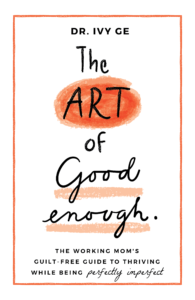Don’t Let Fear Stop You by Dr. Ivy Ge, author, The Art of Good Enough. (Book Excerpt)
 Don’t Let Fear Stop You
Don’t Let Fear Stop You
Do you have something you’ve always wanted to try but never get around to doing? What has stopped you from real- izing your goal? Too much responsibilities and too little time? No, the real answer is fear.
Fear of the Unknown
Fear is like a locked door, keeping us safe with few opportunities.
We are all afraid of the unknown. The mysterious black hole of danger looms over our heads. We imagine all kinds of awful things that could happen. We say our lives aren’t that bad, at least everything is familiar. That is one of the reasons an abused wife stays in the toxic relationship. That is also why some of us continue working day after day at the same job we hate.
Remember the first time you swam in the open water, feeling the wind, the current, that vast body of water around you and beneath you? It was so scary. There was no plastic divider to define the lanes, no walls you could hold onto. Once you relaxed, you realized no matter how deep the water was, you would stay afloat as you had learned in the pool.
All good things require risk-taking—going for a job interview you have little experience in, taking on a big project at work, letting your kids go to school by themselves for the first time. Every milestone in your life requires risk-taking, and the bolder you are, the more you achieve. Unlock the door of fear and you’ll realize there’s nothing to be afraid of. You become more confident of your abilities as you push open more doors that lead you to success.
Here is my story of fear. For years I skied on the green runs for beginners, while my husband, Chu, and my son, Ethan, skied on the advanced runs. The green runs were easy for me. I knew every bump and turn so well I could ski with my eyes closed. Whenever Chu proposed I join them on the advanced runs, I would always decline because I wasn’t ready. Meanwhile, by the time Ethan turned nine he had become a double black diamond skier. Chu was a good teacher, and Ethan was fearless, so naturally he progressed to an expert level within a few short years.One day, Chu brought me over to a lift I had never seen before. Snow covered everything, including the signage, thanks to a white-out storm the day before. I knew it wasn’t a beginner run as I examined the steep slope beneath me.
“Just push off and go. It’s not much steeper than the green runs,” Chu urged me.
His explanation didn’t help. The image of my skis flying in different directions flashed in front of my eyes. The more I thought about the perils of going down that slope, the more paralyzed my legs became.
“I can’t,” I told him. It was cold at the top of the mountain. The wind cut into my face like blades.
“Ethan’s down there waiting. We have to go,” Chu said.
“You go and find him,” I said, “I’ll be fine.”
“Don’t take too long. It’s freezing up here,” Chu said before gliding downhill. Easy-peasy.
I stood still, watching people push off, their colorful ski jackets getting smaller by the second. My feet felt numb. I thought about how exhilarating it would be to meet Chu and Ethan at the bottom of the hill and tell them I did it. I thought about going down by the lift of shame, avoiding people’s eyes as I rode closer to the lift station where long lines of people waited to get on. I didn’t want to be a failure, but I was scared.
I asked myself what was the worst thing that could happen if I skied down. A thick coat of powder snow blanketed everything underneath. If I fell, it wouldn’t hurt. Also, I knew how to stop myself from going too fast on the slope, so it was unlikely that I would fall. Finally, I asked myself this question: “When was the last time I did something I was proud of?”
I couldn’t think of any. By then, my feet were so numb I knew I had to move. I bit my frozen lip and pushed off. The wind was merciless. The speed was much faster than what I was used to. Subconsciously, I leaned backward, which made me go even faster. I felt the bottom of my skies bouncing off the bumps on the slope. I was losing control.
Chu had always told me the steeper the slope, the more I needed to lean forward and put pressure on the front of the skis. Remembering his words, I shifted forward, press- ing my sheens against the tongue of my boots. Immediately, I had better control of my skis. I bent down further to make my turns smooth. About halfway down the slope, I got into a rhythm that felt so good. I realized how exhilarating it was to ski on an advanced run with all the added speed and difficulty. I have never gone back to the beginner runs since.
You see, I never knew I was ready until I pushed off on that intimidating slope. We all need to take calculated risks to stretch our potentials and reach for higher goals.
The wisdom of adulthood teaches us to be cautious and suspicious. But not all unknowns are dangerous. Without trying, we’ll never know if something could work out. Do you know most Americans die regretting not doing the things they wished they had done? Don’t let it be you.
The interesting thing about fear is that once you get over one fear, other fears fade away as well.
It’s all in our head, ladies.
Remember Nike’s slogan: Just Do It.
Fear of Failure
Failure doesn’t mean we’re not good enough, not smart enough.
Failure is circumstantial. It has nothing to do with your talent or value as a person. Here are four tips for avoiding fear of failure.
- Learn to put things in perspective. Stop dwelling on how miserable you feel and focus on what went wrong and how you can best rectify the situation. Take the emotion out of the equation of success.
- Learn to think like men. They have the innate ability to put the sting of failure behind them and jump right back into action. I attended the Association of Writers and Writing Programs (AWP) conference in Oregon in spring 2019. There was a panel of editors at the most prestigious literary magazines in the country. They all said the same thing. When they receive a submission they like but it doesn’t fit for their upcoming issue, they will often ask the writer to submit again for future consideration. Nine out of ten times, the male writers send in their work for the very next publication. Female writers, however, are often never heard from again.
- Failure is an opportunity to look for new ways to improve your odds of winning.
- Success depends on many factors: timing, people, location, and approach.
All of these components have to work together. If you failed, analyze each of these elements and figure out exactly where things went wrong, then correct them and try again. If you still fail, go through the same process until you get it right. Knowledge is what we learn from others; wisdom is the ability to use that knowledge to achieve our goals. Nothing beats the satisfaction of finally figuring out how to become good at something after multiple failures. Begin building your wisdom today, and teach your children to do the same. They’ll learn much more from failure than success.
 Excerpted from The Art of Good Enough by Dr. Ivy Ge, © 2020 by Dr. Ivy Ge, used with permission from the author.
Excerpted from The Art of Good Enough by Dr. Ivy Ge, © 2020 by Dr. Ivy Ge, used with permission from the author.
ABOUT DR. IVY GE: From an aspiring actress to working for airline executives to becoming a pharmacy professor and multi-genre author, Dr. Ivy Ge has transformed her life while balancing her role a working mother and wife. Visit www.ivyge.com.
Tags: achieving goals, dr. ivy ge, empowering children, failure, raising a family, success, the art of good enough















